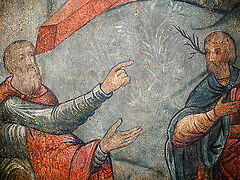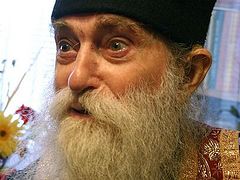Chapter 2
The sinfulness of humanity. Its reflection in the human soul. In the sphere of the mind, emotions, and will. Successive levels of sin. The three sources of sin.
We, Christians, know from the Holy Bible and believe that God created Man in His own image and likeness. Thus, upon creation, man received sinless nature. But even the first man, Adam, did not remain sinless, losing his initially created purity in the first sinful fall in Paradise. The poison of this sinfulness infected all of mankind, originating in sinful progenitors, resembling a poisoned spring oozing fetid water. A person adds his personal sin to the predisposition towards sin, inherited from our progenitors. There is nothing surprising in what the Holy Bible says about each one of us, “there is no man who lives one day and does not sin.” Only the Lord Jesus Christ is absolutely pure from any sin. Even the virtuous, God’s saints, had sin within themselves and although they struggled with it, with God’s help, they nonetheless humbly recognized themselves as sinners. All people, without exception, are sinfully infected by sin.
Sin is spiritual leprosy, illness, an ulcer having struck all of human nature, both its soul and body. Sin has damaged all three basic capabilities or powers of the soul: the mind, the emotions (heart) and the will. The human Mind has darkened and become disposed towards error (the Romans had a saying, “Errare humanum est” (“To err is human”), and man continuously errs, in the sciences, in philosophy, and in his daily life. The human Heart, the center of his suffering’s feelings of goodness and evil, sadness and happiness, is damaged even more by sin. We see “that our heart, which has been covered with the slime and mold of sin, has spent its capabilities of pure, spiritual, and ennobling Christian feeling. Instead of this, it has become inclined towards sensual pleasure and earthly ties, infected also with vanity, amazing in its complete lack love and well-wishing for its neighbor.
Of course, our Will is damaged the most in our capability to act and realize our human intentions. Man’s will seem especially powerless when he needs to accomplish genuine Christian good the most, even when he wants this goodness. Apostle Paul said about this sad powerlessness of the will, For the good that I would, I do not: but the evil which I would not, that I do (Romans 7:19). And therefore, Christ the Savior says about man, the sinner, “Jesus answered them, Verily, verily, I say unto you. Whosoever committeth sin is the servant of sin,” (John 8:34). It, however, often seems to the sinner himself that serving sin is freedom and struggling with the snares of sin, slavery…
How does sin develop in a person’s soul? The Holy Fathers of Christian asceticism and devotion, better than all the learned psychiatrists who claim to know the sinful human soul, differentiate the following levels of sin: The first moment of sin is its introduction, when temptation has only become outlined in a person’s consciousness as a sinful impression, an impure thought, and so on. If during this first moment a person decisively and immediately rejects sin, he will not sin, but will defeat it, and will have a plus, not a minus, for his soul. It is easiest to overcome sin in the beginning. If the beginning is not rejected, it transforms gradually into an unclear striving and then into a conscious, clear desire to sin. Here a person already begins to be drawn towards a particular kind of sin. He can at this moment, without an especially difficult struggle resist succumbing to it and not sin, in which he will be helped by the clear voice of his conscience—and with God’s help if he seeks it.
Man has fallen into sin. The reproaches of the conscience sound loud and clear, eliciting in an as yet unspoiled person simply extreme disgust toward this sin. As previous self-assurance disappears, the person becomes humbled. Look at Apostle Peter before and after his denial. But even here, the triumph over sin is not so difficult, as is indicated by numerous examples of the same Apostle Peter, holy King and Prophet David and other repentant sinners.
It is most difficult to struggle against sin when it becomes a habit, because it recurs frequently. That means generally, when any habits acquired the habitual actions are performed almost automatically, unnoticeable by a person. The struggle with a sin that has become habitual is very difficult because it is hard not only to overcome oneself but also to watch and notice sin approaching.
An even more dangerous stage of sin is a vice. In this case sin controls a person so much that it shackles his will as if by chains. A person is almost powerless to struggle against himself in this and becomes a slave of sin, although he recognizes its harmfulness and in moments of clarity, perhaps even hates it with all his heart. That is, for example, the vice of drinking, drug addiction and the like. In that case, without special mercy and help from God, a person is already unable to control himself and stands in need of prayer and spiritual support from others. One must remember that even any petty sin, like loquaciousness, love of clothing, empty entertainment, etc. can become a vice if it completely overpowers and fills one’s soul.
The highest stage of sin, completely enslaving someone, is the passion towards one or another type of sin. In this condition, a person does not hate his sin, as in a vice (this is the difference between them), but submits all his experiences, actions, and moods to the sin. Compare Pliushkin in Dead Souls or Feodor Karamazov from Brothers Karamazov to the money-lover Judas of Iscariot. In this case, a person clearly and literally admits satan into his heart; as is said about Judas in the Holy Gospel. Once a man is in this condition, nothing can help but grace-giving church prayer and influence.
There is one more special, horrible, and perishing type of sin. This is a deadly sin. Even church prayer, will not help a person in the condition of such a sin. Apostle John the Divine, calling us to pray for our sinning brother, clearly; indicates the uselessness of praying for an unforgiven sinner (If any man sees his brother sin a sin which is not unto death he shall ask and he shall give him life for them that sin not unto death. There is a sin unto death: I do not say that he shall pray for it I John 5:16).
Our Lord Jesus Christ says that this sin is the blasphemy of the Holy Spirit and is not forgiven people in this world nor in the future.
He spoke these terrible words against the pharisees, who clearly saw that He did everything according to God’s will and by God’s power. However, they obdurately perverted the truth, slanderously insisting that He acted with the power of an evil, unclean spirit. They perished in their blasphemy, and this example is instructive and terrible for all those who commit that deadly sin, stubbornly and consciously opposing undoubted Truth, blaspheming the Holy Spirit, the Holy Spirit of God. It is necessary to note that even blasphemy of Our Lord Jesus Christ Himself can be forgiven a person (according to His own words), because it may occur from complete ignorance or temporary blindness. Blasphemy of the Holy Spirit can, according to the teaching of St. Athanasius the Great, be forgiven only when a person has ceased and repented; but this usually does not occur, because the very type, the very character of this sin makes it almost impossible to return to the truth. The blinded one may see again and love the Truth revealed to him; soiled by vices and passions; he can wash himself clean with repentance and become a confessor of Truth. But who and what can change the blasphemer, who although he sees and knows the Truth he stubbornly rejects and hates it? This terrible condition resembles satan’s state, who believes in God and trembles, but hates Him, slanders and opposes Him.
When the temptation of sin appears before a person, it usually comes from three sources: from the flesh, from the world, and from the devil.
Assuredly, a person’s body is, in many instances, the nest, the source of immoral predispositions, strivings, and tendencies. Ancestral sin is our sad, general inclination towards sin, inherited from the sins of our ancestors and our own-personal sinful falls, which accumulate and mutually strengthen each other, creating a source of temptation, sinful tendencies, and actions in our bodies.
Even more frequently, the surrounding world, which according to the word of Apostle John the Divine, “lies in sin” (I John 5:19), is a source of temptation for us. And we know we are of God, and the whole world lieth in wickedness. Friendship with the world is, according to the word of another apostle, animosity towards God. “Ye adulterers, and adulteresses, know ye not that the friendship of the world is enmity with God? Whosoever, therefore, will be a friend of the world is the enemy of God” (James 4:4). The surrounding milieu and people tempt us. There are many intentional, conscious tempters and perverters of youth about whom Our Lord said, “If someone tempts one of these small ones, it is better for him if a millstone be around his neck and he be drowned in the sea depths…”. External plenty—wealth, comfort, immoral dances, dirty literature, and brazen clothes—are temptations. All these are the fetid sources of sin and temptation.
The most important and rooted source of sin is, of course, the devil, about whom Apostle John, the Divine, said, He that committeth sin is of the Devil; for the devil sinneth from the beginning (I John 3:8). Struggling with God and His truth, the devil fights also with people, striving to destroy every one of us. Evil is especially obvious when it is struggling with the saints (even daring to tempt the very Lord Jesus Christ), as can be seen in the Holy Gospel and in the Lives of the Saints. The Lord protects us, the feeble and weak, with His strength from those cruel temptations to which God’s saints, strong in spirit, were exposed. However, the devil doesn’t leave us without his attention, acting through the temptations of the world and the flesh, making them stronger and more seductive, and also tempting by various kinds of sinful thoughts.
In the last years, his evil influence, along with all the others, is evident especially in epidemics of different kinds of suicide. That is why Apostle Peter compares the devil with a growling lion, stalking us, “seeking whom he may devour” (Be sober, be vigilant; because your adversary the devil; as a roaring lion walketh about, seeking whom he may devour I Peter 5:8).






